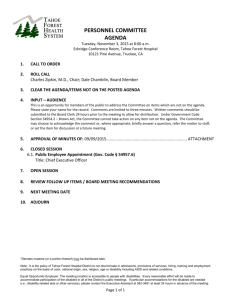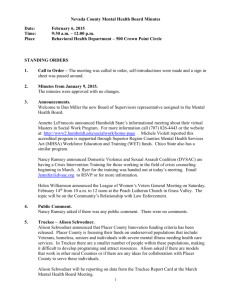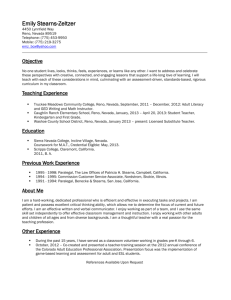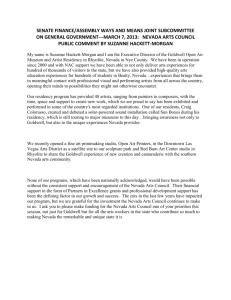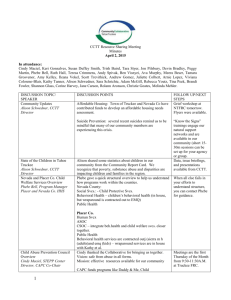2015-04-03 Mental Health Board Minutes Amended
advertisement
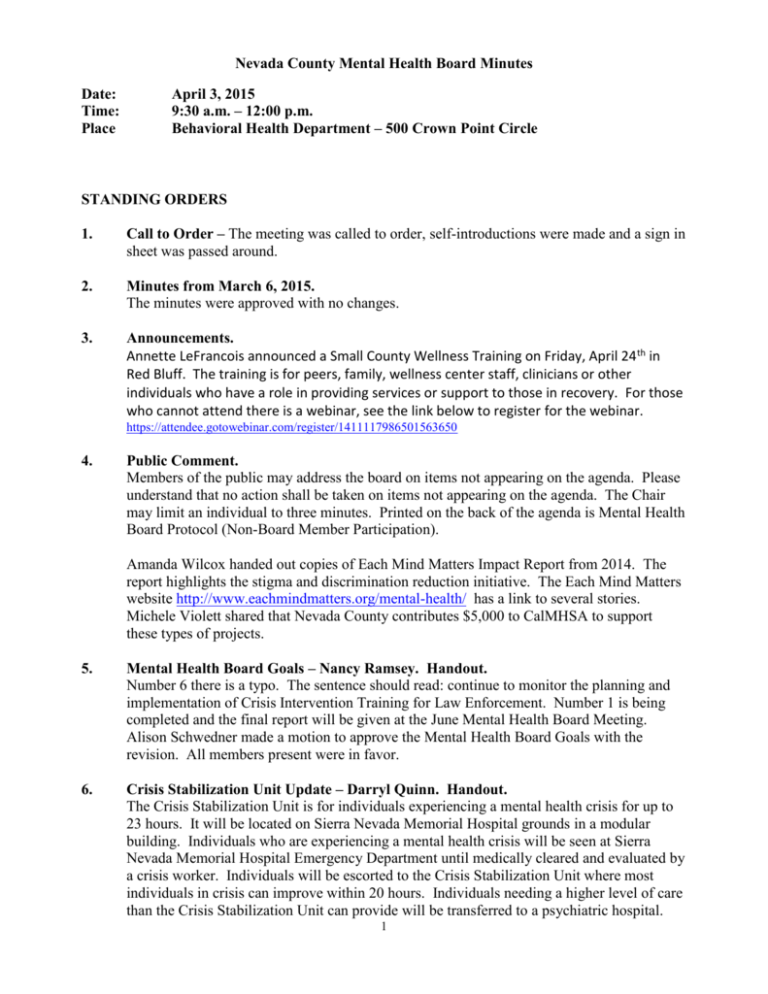
Nevada County Mental Health Board Minutes Date: Time: Place April 3, 2015 9:30 a.m. – 12:00 p.m. Behavioral Health Department – 500 Crown Point Circle STANDING ORDERS 1. Call to Order – The meeting was called to order, self-introductions were made and a sign in sheet was passed around. 2. Minutes from March 6, 2015. The minutes were approved with no changes. 3. Announcements. Annette LeFrancois announced a Small County Wellness Training on Friday, April 24 th in Red Bluff. The training is for peers, family, wellness center staff, clinicians or other individuals who have a role in providing services or support to those in recovery. For those who cannot attend there is a webinar, see the link below to register for the webinar. https://attendee.gotowebinar.com/register/1411117986501563650 4. Public Comment. Members of the public may address the board on items not appearing on the agenda. Please understand that no action shall be taken on items not appearing on the agenda. The Chair may limit an individual to three minutes. Printed on the back of the agenda is Mental Health Board Protocol (Non-Board Member Participation). Amanda Wilcox handed out copies of Each Mind Matters Impact Report from 2014. The report highlights the stigma and discrimination reduction initiative. The Each Mind Matters website http://www.eachmindmatters.org/mental-health/ has a link to several stories. Michele Violett shared that Nevada County contributes $5,000 to CalMHSA to support these types of projects. 5. Mental Health Board Goals – Nancy Ramsey. Handout. Number 6 there is a typo. The sentence should read: continue to monitor the planning and implementation of Crisis Intervention Training for Law Enforcement. Number 1 is being completed and the final report will be given at the June Mental Health Board Meeting. Alison Schwedner made a motion to approve the Mental Health Board Goals with the revision. All members present were in favor. 6. Crisis Stabilization Unit Update – Darryl Quinn. Handout. The Crisis Stabilization Unit is for individuals experiencing a mental health crisis for up to 23 hours. It will be located on Sierra Nevada Memorial Hospital grounds in a modular building. Individuals who are experiencing a mental health crisis will be seen at Sierra Nevada Memorial Hospital Emergency Department until medically cleared and evaluated by a crisis worker. Individuals will be escorted to the Crisis Stabilization Unit where most individuals in crisis can improve within 20 hours. Individuals needing a higher level of care than the Crisis Stabilization Unit can provide will be transferred to a psychiatric hospital. 1 Darryl Quinn reviewed a draft floor plan of the Crisis Stabilization Unit with the Mental Health Board. The Crisis CSU Request for Proposal will be released in April. Several Mental Health Board members requested a copy of the draft proposal. Annette LeFrancois will email a copy to Mental Health Board members. 7. Truckee Report Card – Alison Schwedner. Handout. Alison Schwedner is the Director of Community Collaborative of Tahoe Truckee. The Collaborative is made up of 45 different health, education and social service agencies working together to address basic needs of kids, families and seniors in the Tahoe Truckee area. Several years ago the Collaborative began looking at data to help direct where to put times, energy and resources as a community. In 2007 the Collaborative produced a community report card that has recently been updated. The report can also be found on their website under results scorecard at: www.communitycollaborative.org. The data is comprised of: Economic Wellbeing Data, Health Information and Education. The goal of sharing the data is to paint the picture of what it is like for kids, families and seniors living in the Tahoe Truckee area. People often think of the Lake or Truckee and don’t see the local community or the issues the community struggles with. The Tahoe Truckee region has seen significant growth from 1990 to the year 2000. The Tahoe Truckee area is one of the top ten most expensive places to live in the Country. Ten percent of the population is living 100% below the poverty level and will qualify for Head Start, Medi-Cal, CalWorks and CalFresh. Eighteen percent of the population is living 200% below the poverty level (Family of 4 making $44,000 or less per year) and will qualify for some benefits. Most of the population is making slightly more than $44,000 and will not qualify for assistance, but are not making enough money to be self-sufficient in Tahoe Truckee. This creates a heavy reliance on non-profits and other community based organizations. Overall Placer and Nevada County are among the healthiest of California’s Counties. Tahoe Truckee residents enjoy healthy lifestyles with a strong emphasis on recreation, nutrition and healthy choices. The 2011 Tahoe Forest Hospital District Community Health Needs Assessment identified significant disparities in many health indicators between Hispanic and non-Hispanic residents. The California Healthy Kids Survey is done every two years with 7th, 9th and 11th graders. The Tahoe Truckee Unified School District 2014 results show 32% of 7th, 38% of 9th and 35% of 11th graders report feeling sad and hopeless in the past 12 months. These numbers are higher than the State average and those of Placer and Nevada County. Alcohol usage among adults is higher than the State and the Country. Thirty percent of Tahoe Truckee residents binge drink compared to 16% across the State. Last year over two thirds of the DUI’s in Nevada County came from Town of Truckee residents. There are significant education disparities for low income students and English language learners. Third grade reading proficiency is the most important predictor of high school graduation and career success. In the Tahoe Truckee Unified School District, thirty eight percent of students are not proficient readers by the end of third grade and of those, sixty eight percent of low-income children are not proficient readers. 2 8. Planning for a Truckee Mental Health Board Meeting – Annette LeFrancois. A decision was made to hold the June 5th meeting in Truckee at the Joseph Center in the Truckee Donner Room. Mental Health Board members will think about other places to visit while in Truckee. Annette LeFrancois will arrange for a van. 9. Explore the Word and Concept of Recovery when it applies to serious mental illness – Iden Rogers. Iden Rogers spoke on the topic of recovery. He is troubled by the use and meaning of the word recovery when it applies to serious mental illness. The word recovery is becoming common and is scattered among various MHSA documents and usage is common in the mental health field. We often think of recovery as it applies to a cold or a person healing from a broken bone. Would like to think State and County Departments and Agencies would not casually toss around the word recovery as a fashionable feel good word and especially not use it for chronic mental health diagnoses to engender false hopes in a consumer or in a consumer’s family. How is recovery defined? Do people with serious mental illness recover? A quote “Recovery refers to the process in which people who are diagnosed with a mental illness are able to live, work, learn, and participate fully in their communities.” Recovery is not a one size fits all concept. Recovery is an ongoing process. Janice Deardorff suggests that all clinical staff especially those in access have an appreciation about what they convey to new and existing clients. 10. Access to Services – Helen Williamson, Janice Deardorff & Iden Rogers. The subcommittee has completed interviews with community agencies about accessing County Behavioral Health services. The interviews with Western Sierra Medical Center and Sierra Family Medical Clinic were recently completed. Western Sierra Medical Center recently moved into their new building and is experiencing a dramatic increase in clients. Janice Deardorff gave an overview of the behavioral health staff working at the center and their concerns about referrals to Behavioral Health and communication when clients do not meet medical necessity criteria. The Sierra Family Medical Clinic results were consistent with the other agencies interviewed and reflect that improvements to communication and collaboration between Behavioral Health and other community agencies are needed. Helen Williamson announced they hope to have a final report before the end of June. Helen Williamson recommended that Mental Health Board members review Welfare and Institutions Code that describes requirements for County Behavioral Health Departments. 11. Mental Health Board Nominations and Election of Vice Chair. Since there was not a quorum, voting will take place next month. 12. Change the date of the July Mental Health board Meeting due to the Holiday – Annette LeFrancois. Friday, July 3rd is a County Holiday. The following week Annette LeFrancois will be on vacation. Annette LeFrancois will look for another Friday in July and email Mental Health Board members. This will be discussed at the May Mental Health Board Meeting. 13. Mental Health Board Training 3 Train the Trainer: Mental Health Boards 101. The Training is on Friday, April 17, 2015 from 1:00 p.m. – 5:00 p.m. in San Pedro. Janice Deardorff has volunteered to attend. Annette LeFrancois will make the travel arrangements. 14. Crisis Peer Counseling. This will be discussed at next month’s Mental Health Board Meeting. 15. Suicide Rate – Rebecca Slade. There have been 5 suicides in the last month in the Truckee area in Placer County. Nevada County does not have the highest suicide rate in the State of California. The State average is 9 per 100,000. Nevada County has 16 – 17 per 100,000. All northern California, small rural Caucasian Counties have a similar suicide rate. Amanda Wilcox announced at the last Suicide Prevention Task Force Meeting they discussed getting a more detailed report from the Coroner that would include: age, race, and means. This would be helpful information for the Mental Health Board as well. Rebecca Slade referred to a nationwide study from the Harvard School of Public Health on what makes certain regions have a higher suicide rate than another. A correlation was found between the percentage of completed suicides and the number of people in the community who have guns. There was discussion on educating the public that when they have a family member at risk to store the gun so that the family member cannot access it. Many local gun dealers will offer temporary firearm storage. REPORTS 1. Behavioral Health Director’s Report – Rebecca Slade. Handouts. There are monthly meetings with Sierra Nevada Memorial Hospital for the Crisis Request for Proposal. Rebecca Slade invited Mental Health Board members to attend the monthly meetings. You must RSVP to Rebecca Slade if you are interested. The Respite Center is scheduled to open May 1st. The Behavioral Health budget will be submitted to the budget subcommittee on April 13th. Behavioral Health has a monthly meeting with contractors and will be meeting individually with the contractors to discuss their contract renewals. The contractors have been notified about the budget reductions for next year’s contracts, but may not have informed their staff. Rebecca Slade recently attended a Quality Assurance Conference. The State will begin extrapolation for audits. An audit showing more than 5% in errors for an audit, for example if there were 10% in errors, the penalty will be 10% of the funding for the year. Rebecca Slade handed out EQRO audit data for 2013. Results for Nevada County show the penetration rate is twice the State average. Nevada County serves 82% of Foster Care youth with the State average being 50%. 2. Mental Health Services Act (MHSA) Report – Michele Violett. Handout. Michael Violett announced the MHSA Three Year Plan for fiscal year 2014/15, 2015/16 and 2016/17 has been approved by the Nevada County Board of Supervisors. 4 There has been discussion about sanctioning MHSA Programs if deadlines are not met. Regulations are being rewritten to include a deadline of December 31st of each year. Housing Behavioral Health is working with Nevada County Housing Development Corporation to lease a nine unit apartment that will provide housing for Behavioral Health clients. This will be going to the Board of Supervisors next month. Prevention and Early Intervention (PEI) EMQ is still looking to hire a therapist to provide short term therapy in the Truckee schools. The Moving Beyond Depression Program has had a delay in getting a contract. The program may not start until July. Michele Violett sent in a Letter of Acknowledgment to CalMHSA for Phase I and II Projects. Per the community planning process it was noted in our Letter of Acknowledgment that our funds would not go to any organization that did not support Laura’s Law or Assisted Outpatient Treatment. Innovation There have been four Innovation community planning meetings. Michele Violett will be communicating to the Mental Health Oversight and Accountability Commission about our plans for Innovation and get feedback on whether or not our Innovation Plan (Respite Center, Crisis Stabilization Unit and Community Planning Process) fit the Innovation Guidelines. Workforce Education and Training (WET) Mental Health First Aid Training is being offered on March 11th and May 8th. Refer the flyer that was handed out for more information. Superior Region WET is presenting a Peer Core Competency Training Proposal. Each County will be able to send four participants. The Training is 12 months and would be in person, by computer and phone. 3. Communication – Future Mental Health Board Agenda Items. Email future agenda items to Nancy Ramsey at nancy@dvsac.org or Annette LeFrancois at annette.lefrancois@co.nevada.ca.us . ATTENDANCE: Members Present: Iden Rogers, Helen Williamson, Nancy Ramsey, Janice Deardorff, Linda Villegas, Alison Schwedner. Excused Absent Supervisor Miller. BH Staff: Rebecca Slade, Michele Violett, Annette LeFrancois. Visitors: Laura Parker-Preston, Amanda Wilcox, Shera Banbury, Mariya Fuentes. Minutes by Annette LeFrancois 5
